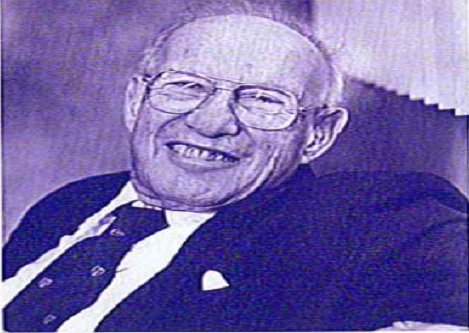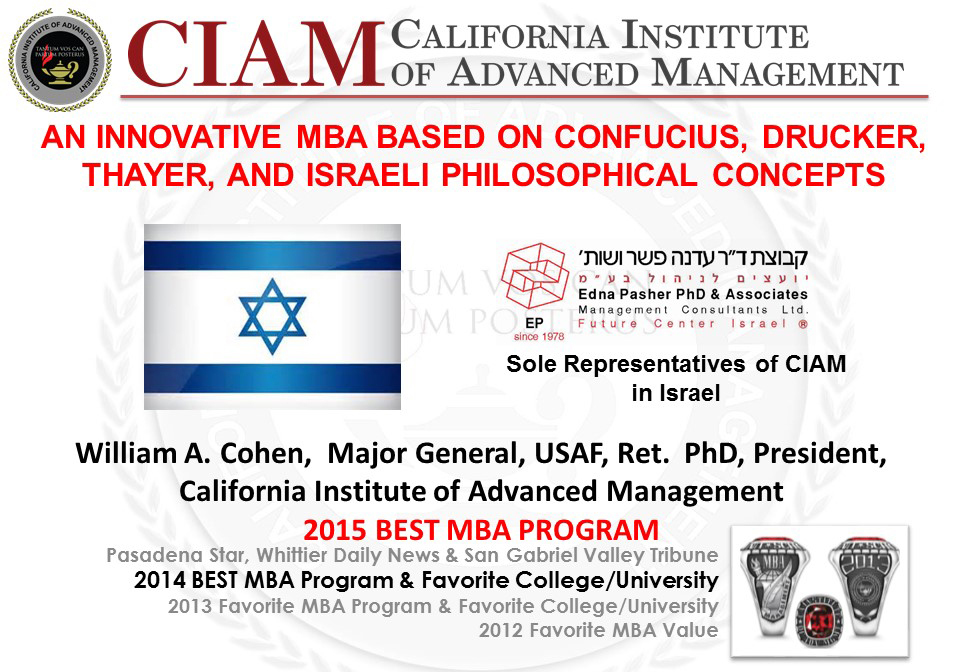
whether you are a consultant yourself, interested in becoming a consultant, or you are a manager of anything, or on the way up, you will benefit from the information it contains in the management of any endeavor if you act on Drucker’s consulting principles explained in it.
פורסם: 20.11.16 צילום: יח"צ
Why should anyone write another book on consulting? More importantly why would anyone want to read one? There are dozens of books written about consulting. Heck, I wrote one myself and it’s currently in its fourth edition after selling something like 100,000 copies over the last twenty years. Since I am the author of the new book Peter Drucker on Consulting I am probably best positioned, if fact, ethically obligated, to tell you why I believe you should read this book, whether you buy it or not. Yes, the library or a friend’s loaner works just as well.
What was it that George Zimmer, founder of Men’s Wearhouse, who sold the men’s suits through advertisements, used to say in his advertisements on TV? I think it was: “You’re going to like the way you look. I guarantee it.” Well, Peter Drucker isn’t around to guarantee this book — and anyway I wrote Peter Drucker on Consulting. So it’s up to me to say, “ You’re going to like how you will benefit from reading this book, as both a manager and a consultant. I guarantee it.” Let’s see how and why.
Peter Drucker on Consulting
Peter Drucker was a genius of the type that only shows up only once every hundred years or so. It is not for nothing that he is called “the Father of Modern Management.” When Drucker started out to write About management, any bookstore could only show you a few books on the subject. Heck, Peter told his first nine PhD students in the new program he founded with his Dean Paul Albrecht at Claremont Graduate University “When I was first assigned duties as a management consultant during World War II, I didn’t know what a management consultant did, and nobody could tell me, either.” Today the bookshelves groan under the weight of books on management. This is the man who invented the term “knowledge worker” and moved personnel from the debit to the credit side of the accounting ledger.
Drucker’s consulting for Jack Welch at the very start of Welch’s tenure as CEO of GE began the upward climb of Welch’s GE to incredible heights. In the twenty year period of Welch’s leadership, the company's value rose 4,000%. And remember, GE was not a startup. Its sales were already in the hundreds of millions of dollars when he took over. On leaving the company and going into retirement Welch was presented with the largest severance check in history: a colossal $417 million. And yes, he had to pay tax on this gift from a happy Board.
Welch is known as one heck of powerhouse manager, but I never heard him described as modest. Yet he credits much of his almost unbelievable success to the consulting Drucker gave him not in stacks of reports and slick PowerPoint presentations, but rather in only two simple questions which Drucker asked. Note I did not say answers which Drucker provided, but questions he asked. I’ll leave those for you to read in the book.
Drucker’s Amazing Accomplishments
What Drucker accomplished in a lifetime of work was amazing. It was he who convinced us that marketing and selling were not identical functions and then went on to baffle us by proving that not only were marketing and selling not complementary, but that they could actually be adversarial. Few understand this concept, even today. But, here’s a hint. He was NOT saying that selling was unimportant — in fact, just the opposite.
More than forty years ago he predicted “the Great Recession” which he said was inevitable due to mismanagement and bad leadership by both top management and unions. Few understand the preciseness and values of his recommendations in this area, because most still commit and are still committing the same errors today.
Drucker’s ideas frequently came from something that I heard him say hundreds of time as his student, but I have not seen in print. This was: “What everybody knows is usually wrong.” I found that he and Einstein used the same methods of analytic discovery. Any consultant can do this. Any manager can do this. Unfortunately, few managers or consultants actually do.
Let’s look at one other simple Drucker concept. It was the necessity to abandon “successful” products and services. In his unique methods of consulting he demonstrated exactly why and how to accomplish this. Yes, that’s right: success by abandoning profitable products, services, and even businesses. Yet few consultants of any kind even include this in their analysis or recommendations with a client at the conclusion of their engagement. And you can bet that managers struggle with following this proven Drucker principle, either.
Drucker’s Methods Weren’t Like Anyone Else’s
I find this fascinating. Even today, ten years after his death, his principles are studied in business schools, and there are Drucker Societies all over the world. But he distained the title of “Management Guru” and said that basically all he did, even in consulting was to think. Asked in class how he could possibly gather the knowledge and experience to be so effective a consultant in so many different industries, profit and non-profit, and for governments from local to national, all over the world, he told his students, “I don’t bring my knowledge and experience to consulting engagements; I bring my ignorance.” And then he went on to prove that he was not simply speaking glib nonsense — he was telling the absolute truth.
Potential clients have written that as a consultant, Drucker took some getting used to. Other famous consulting companies would descend on top managements, make presentations of their intentions, gather data from throughout the organization, usually over an extended period of time, and leave to return some months later with realms of computer printouts, a full team of Power Point presenters and a day’s briefing telling the client what he must do and why. They would then present a hefty bill.
Drucker might present a hefty bill, but he worked alone and without either burdening the clients with extensive presentations either at the beginning or the end of the consulting engagement. Basically, he consulted by asking questions and getting the client membership themselves to come think through to incredibly innovative and effective solutions to their problems. So the knowledge came from the real experts with the knowledge and experience: the clients. What Drucker did was to facilitate them doing this. If you think this was superficial, and worth little, think again. As Drucker’s clients maintained, it was worth a great deal. That’s how management genius Jack Welch was able to earn that super high severance check. The wonder thing is that you can apply Drucker’s methods yourself.
I wish I could tell you more about what’s in Peter Drucker on Consulting, but you can get that from picking up the book and glancing through the Table of Contents. Instead of more, just let me close by saying again. “You’re going to like the benefits of your reading this book. I guarantee it.”
*Adapted from Peter Drucker on Consulting: How to Follow Drucker’s Principles for Business Success (LID, 2016).
**בצילום: פיטר דרוקר, באדיבות The Drucker Institute, Claremont Graduate University

***הכותב ד"ר ביל כהן הנו מומחה בתורת המנהיגות. ד"ר כהן הינו גנרל מאיור בדימוס בחיל האויר האמריקאי, בעל תואר דוקטור בניהול מאוניברסיטת קלרמונט. כתב למעלה מ- 50 ספרים שתורגמו ל- 22 שפות בנושאי ניהול ומנהיגות. ביל כהן שימש כיועץ בעמדות בכירות וכמרצה באוניברסיטאות הטובות בארה”ב בינהן ביה”ס לניהול באוניברסיטת קלרמונט וב-UCLA. בנוסף, הוא מעביר הרצאות וסמינרים בנושא מנהיגות בכל זרועות הצבא האמריקאי ובאקדמיה הצבאית וזכה בפרסים על הרצאותיו בעולם. מעבר להיותו גנרל בצבא ארה”ב, ד”ר כהן הנו בעל דרגת רב סרן בחיל האויר הישראלי והשתתף בקרבות אוויר במלחמת יום כיפור. שימש בתפקידי ניהול בכירים במספר חברות וכיהן כנשיא של שתי אוניברסיטאות פרטיות. ביל כהן היה חבר דירקטוריון במספר מועצות מנהלים ומועצות סחר עירונית, ממשלתיות ושל תאגידים שונים.ביל כהן היה תלמידו הישיר לדוקטוראט של פיטר דרוקר אבי תורת הניהול המודרנית שאמר עליו בין היתר כי ” ביל כהן היה סטודנט אשר אני והקולגות שלי למדנו ממנו לפחות כפי שיכולנו ללמד אותו”.
ד"ר ביל כהן הוא נשיא המכון לאמנות המנהיגות, מייסד המכון ללימודי ניהול מתקדם בקליפורניה CIAM וחבר בצוות המומחי של קבוצת ד"ר עדנה פשר שות'
קבוצת ד"ר עדנה פשר ושות' היא הנציגה הבלעדית של תוכנית CIAM בישראל
Tags: מנהיגות ניהול תרבות ארגונית







































































